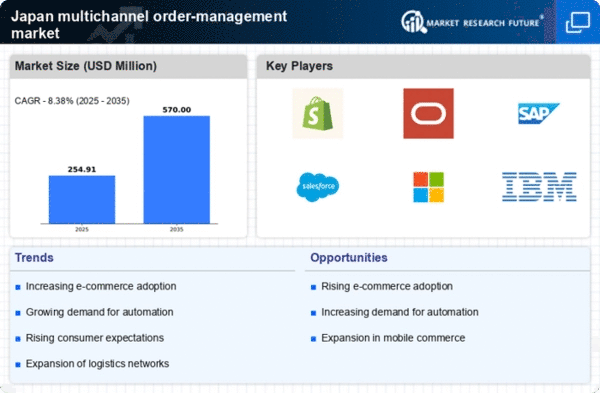Rising E-commerce Adoption
The increasing adoption of e-commerce in Japan is a pivotal driver for the multichannel order-management market. As consumers increasingly prefer online shopping, businesses are compelled to enhance their order management systems to accommodate this shift. In 2025, e-commerce sales in Japan are projected to reach approximately $200 billion, reflecting a growth rate of around 10% annually. This surge necessitates robust multichannel order-management solutions that can seamlessly integrate various sales channels, ensuring efficient order processing and fulfillment. Companies that invest in advanced order management systems are likely to gain a competitive edge, as they can respond more effectively to consumer demands and preferences. Thus, the multichannel order-management market is positioned for significant expansion, driven by the need for businesses to adapt to the evolving retail landscape.
Consumer Demand for Personalization
Consumer demand for personalization is a crucial driver of the multichannel order-management market. Japanese consumers are increasingly seeking tailored shopping experiences, which compels retailers to adopt more flexible and responsive order management systems. In 2025, it is projected that 70% of consumers in Japan will expect personalized services, influencing how businesses approach their order fulfillment strategies. This trend necessitates the integration of customer data into order management processes, allowing for customized promotions and product recommendations. As a result, companies that leverage multichannel order-management solutions to deliver personalized experiences are likely to enhance customer loyalty and drive sales growth. The market is thus expected to expand as businesses strive to meet these evolving consumer expectations.
Regulatory Compliance and Standards
Regulatory compliance and standards are increasingly shaping the multichannel order-management market in Japan. As the government implements stricter regulations regarding data protection and consumer rights, businesses must adapt their order management practices accordingly. In 2025, compliance-related costs for Japanese retailers are anticipated to rise by 15%, prompting a reevaluation of existing systems. Companies that fail to comply with these regulations risk facing significant penalties and reputational damage. Consequently, there is a growing demand for multichannel order-management solutions that incorporate compliance features, ensuring that businesses can navigate the complex regulatory landscape effectively. This driver indicates that investment in compliant systems is not only necessary for legal adherence but also for maintaining consumer trust.
Shift Towards Omnichannel Retailing
The shift towards omnichannel retailing is a significant driver for the multichannel order-management market. Japanese retailers are increasingly recognizing the importance of providing a seamless shopping experience across various channels, including online, mobile, and brick-and-mortar stores. In 2025, it is estimated that omnichannel sales will account for over 50% of total retail sales in Japan, highlighting the need for integrated order management solutions. This trend compels businesses to adopt systems that can synchronize inventory, orders, and customer interactions across all platforms. As a result, the multichannel order-management market is likely to experience substantial growth, driven by the necessity for retailers to create cohesive and efficient shopping experiences for consumers.
Technological Advancements in Logistics
Technological advancements in logistics are significantly influencing the multichannel order-management market in Japan. Innovations such as artificial intelligence, machine learning, and real-time data analytics are transforming how businesses manage their supply chains. In 2025, it is estimated that logistics technology spending in Japan will exceed $30 billion, indicating a strong focus on enhancing operational efficiency. These technologies enable companies to optimize inventory management, reduce delivery times, and improve customer satisfaction. As logistics becomes increasingly complex, the demand for sophisticated multichannel order-management solutions that can integrate with these technologies is likely to rise. This trend suggests that businesses must invest in advanced systems to remain competitive in the rapidly evolving market.
















